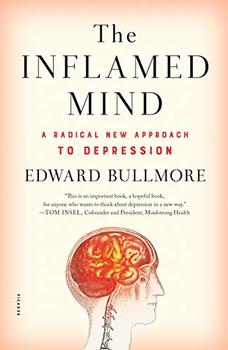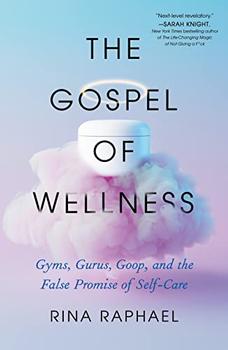Summary | Excerpt | Reviews | Beyond the book | Read-Alikes | Genres & Themes | Author Bio

A Radical New Approach to Depression
by Edward BullmoreIt is common knowledge that depression diminishes the quality of sufferers' lives, but few people realize its full collective impact. Depression is one of the most significant global health issues today, predicted to be the single most common cause of disability in the world by 2030. It also impacts economic growth; for example, it is estimated that depression reduces Britain's annual gross domestic product by 4% annually. In The Inflamed Mind: A Radical New Approach to Depression, Edward Bullmore declares it shocking that the medical establishment's approach to this condition has not changed since the 1990s, considering the pressing social and personal ramifications. The standard regimen of serotonin-changing drugs and psychotherapy remain the only therapeutic avenues available, despite clear signs that these treatments are not universally effective.
Bullmore was drawn to the threshold between body and mind - what is now called immune-psychiatry or neuro-immunology - in 1989 when he was training to become a physician. He consulted with a patient named Mrs. P who had rheumatoid arthritis, a chronic inflammatory joint disease. Veering from the script of questions doctors are told to ask patients about rheumatoid arthritis, Bullmore inquired about her mood, and Mrs. P reported the classic symptoms of depression, such as lowered energy, reduced pleasure, disrupted sleep, pessimism and guilt. Bullmore was eager to share his diagnosis with the senior physician on staff, hoping to more fully treat Mrs. P and improve her quality of life. However, the attending doctor was unimpressed: "Depressed? Well, you would be, wouldn't you?" Mrs. P is a recurring character throughout the book, a reminder of what immunodeficiency looks like and how it is regarded in the medical community. Patients like Mrs. P have been trapped in what Bullmore calls "medical apartheid," the divide between the treatment of the mind and body. The prevailing point of view in the medical field is that if Mrs. P was depressed because she was ill, it was her responsibility to work through the problem on her own by worrying less about her rheumatoid arthritis. Bullmore wonders: What if Mrs. P was not depressed because she was mentally fixated on her pain, but because of a more tangible and direct correlation between these two conditions? In other words, what if Mrs. P's depression was caused by her body instead of her mind?
To make this argument, Bullmore defies conventional medical wisdom, analyzing the philosophical foundations of modern medicine, most prominently René Descartes' mind-body dualism, which suggests that the mind and body are two separate and unrelated systems (this theory is known as Cartesianism, from Descartes' Latinized name, Cartesius). Bullmore explains the gravity of the Cartesian blind spot, suggesting that medical practitioners are positioned and trained to think that if something is caused by the mind, it is a problem of the mind, so it should be cured in the mind. This has created harsh barriers in the medical field that are detrimental to patients' health.
To prove this theory, Bullmore responds to two primary questions: 1. How exactly do inflammatory changes in the immune system modify the brain to make people depressed, and 2. What initially inflames a patient, and how does the immune system - which is designed to help people avoid disease - cause depression? To answer these questions, he compiles the results of surveys, case studies and labs. One key revelation from this research is that scientists have identified the first biomarker in psychiatry: cytokines. A biomarker is a measurable substance that, when present in certain ranges, indicates that something - whether it is disease, infection or exposure - is present in the body. This means that just as doctors can determine vitamin D deficiency through simple blood tests, they can also determine the likelihood and severity of inflammation-caused depression by looking at the number of cytokines present.
While most mass-market publications in the realm of psychology provide some sort of call to action, The Inflamed Mind lacks potential solutions for individuals. In fact, Bullmore clearly identifies the flaws of the slow-moving, conservative pharmaceutical industry, and walks readers through the disappointing reality of what would happen if you were to ask your doctor to consider the ideas presented in this book. Thus, the book ends in a quagmire: Here is all of this information that can positively affect the way depression, schizophrenia and Alzheimer's are treated, but these findings may never be put into practice. Readers like Mrs. P who have issues with inflammation and mental health may remain unempowered by the medical field, especially since no clear steps are detailed to promote these findings. It is implied that all readers can do is wait and see what happens.
One way that Bullmore could have incorporated patient autonomy is by analyzing branches of medicine that focus on a holistic, well-rounded treatment philosophy. This book analyzes Western medicine only, which is inextricably linked to Cartesian thought. Eastern medicine, and homeopathic and alternative approaches to healing are a sampling of practices that more thoroughly combine body and mind in treatment strategies. In 2012, Harvard researchers found that in the prior year, there was a 15% growth rate in the use of homeopathic remedies as a supplement to conventional Western medicine in the United States (though only 2% of Americans reported using homeopathic remedies). In countries such as Germany and Italy, 10-15% of patients supplement Western medicine with these methods. As a trend, people are opting for health and well-being practitioners who approach the mind and the body together, so a discussion on future areas of research that involve these types of treatments would have been an interesting counterpoint.
In light of the contradictions to Western medical ideology and funding cuts to mental health, Bullmore is hopeful but measured about the potential results of his findings, admitting that this connection between the immune system, stress and mind may not ever seep into standard medical practice. Still, he concludes with an optimistic image of what the future might look like if these revolutionary developments are embraced: new treatments, new medications, new biomarkers, new therapies, new doctors, less stigma, less guesswork and fewer blinders.
![]() This review was originally published in The BookBrowse Review in January 2019, and has been updated for the
January 2020 edition.
Click here to go to this issue.
This review was originally published in The BookBrowse Review in January 2019, and has been updated for the
January 2020 edition.
Click here to go to this issue.

If you liked The Inflamed Mind, try these:

by Rina Raphael
Published 2023
Journalist Rina Raphael looks at the explosion of the wellness industry: how it stems from legitimate complaints, how seductive marketing targets hopeful consumers–and why women are opening up their wallets like never before.

by Marty Makary
Published 2021
One in five Americans now has medical debt in collections and rising health care costs today threaten every small business in America. Dr. Makary, one of the nation's leading health care experts, travels across America and details why health care has become a bubble.
In war there are no unwounded soldiers
Click Here to find out who said this, as well as discovering other famous literary quotes!
Your guide toexceptional books
BookBrowse seeks out and recommends the best in contemporary fiction and nonfiction—books that not only engage and entertain but also deepen our understanding of ourselves and the world around us.